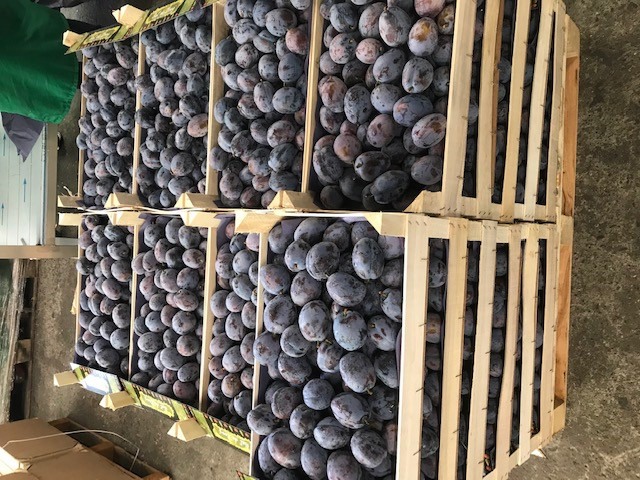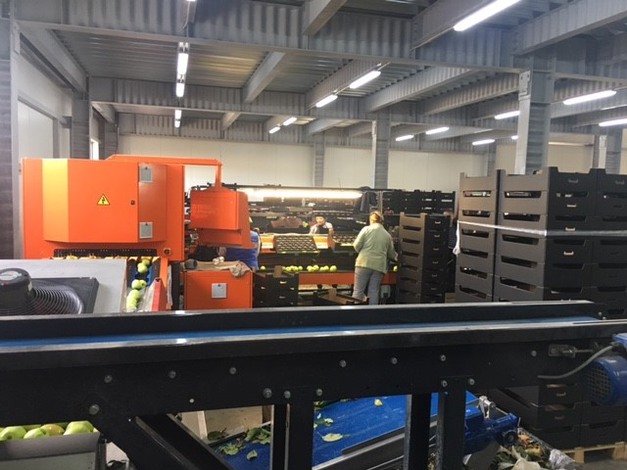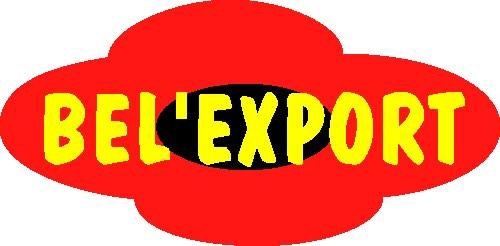This time we hear from someone in Western Europe about the Moldovan story, in which, so far, only the locals have had their say. We sought out a grower/dealer familiar with this Southeast European region, its culture, and, above all, this small Ukrainian neighbor's fruit sector. Tony Derwael, who owns Bel'Export, fits that bill. "I've been there more than once. I wanted to set up something to export to Russia, but it didn't happen in the end," Tony explains his link to Moldova.
Bel'Export is a Belgian cultivation and trading company that focuses on top fruit - 30 million kg of pears and 15 million kg of apples pass over its packing facility's processing lines annually. It, too, was hard hit when, on August 7, 2014, Russia placed an embargo on European fruit, meat, fish, and dairy products.
Russia had long been Moldovan fruit's most important market, yet, according to Tony, growers and exporters in Moldova had always kept an eye on the Western European market. "At times, we've had to import particularly plums, and they manage to fill that gap. That product is of excellent quality."

Few Moldovan apples on the E.U. market
"Apples are a different story. Moldovan apples may taste wonderful, but I see few opportunities for them in the Western European market. First of all, the competition from Poland is too fierce. That country has a huge supply and can also offer the product more cheaply. A trip from Moldova to here easily costs €5,000, that's €0.25/kg, while you can get Polish Galas duty-free for €0.40/kg. By comparison, French Galas are traded at €0.80 to €0.90." Once maritime transport from the Black Sea resumes, one has to wonder if reefer container shipping - still three times cheaper than road transport - could provide an opportunity for Moldovan fruit exports to Western Europe.
Local for local: protectionism?
Regardless, Moldova not only has to compete with cheaper Polish products; it also faces - as reported in the previous articles - the prestige Western and Southern European produce enjoys. "Supermarkets here offer Galas, but they're invariably from France or Italy," Tony explains. In this sense, E.U. consumers' preference for local cultivation - for diverse reasons; sustainability being the main one - also points to a form of real or implied protectionism. "France and Germany, the largest Western European markets, will only import produce when they no longer have any of their own stock."
This self-preservation was evident in mid-June. Members of the Association Nationale Pommes Poires (ANPP) and Fédération Nationale de la Pêche en France (FNPF) spoke out against what was then still a European Commission proposal to double the tariff-free quotas of seven Moldovan horticultural products, including apples. These French associations did not question this move's admirable intention (support for the Moldovan economy affected by the war in Ukraine). Still, they warned that the European, particularly the apple market, may destabilize.
"I don't support protectionism; I believe in free trade and want to include Moldovan growers in this. But I don't think quota expansion will help them export more apples to Western and Northern Europe right away. That's also because there's little market space here for their varieties. They grow very few Jonagolds, while Belgians are still very keen on this apple 40 years later. They have no Elstar, to which the Dutch and Germans are devoted. They have other varieties, often newer ones than we have here. By the way, Belgium has to prepare to exchange the Jonagold for a different apple. This variety is nearing its expiration date, while the Elstar still has years to go in the Netherlands and Germany."
Romania, the Middle East, and India
"So, what can Moldova offer? Braeburn and Gala, for example, or Fuji. I see definite opportunities in the U.K. and Romania, Moldova's big E.U. neighbor to the west, where people speak the same language. In that sense, doubling the quotas could prove to be of use, although Romania, with its 19 million inhabitants, isn't exactly the biggest market either."
Tony understands the Moldovan growers are talking about the Middle East. "I can indeed see salvation in that. That market is big enough (57.6 million inhabitants in 2021 according to World Bank figures, if you add up the potential markets like Israel, Saudi Arabia, Qatar, and the United Arab Emirates' populations - ed.), and the varieties Moldova has to offer are popular there. There is some competition from South Africa and the U.S."

"But I think Moldova has a competitive advantage regarding transport times and rates. I even think the European government could be of help. It could follow the example of the programs USAID has successfully implemented for decades in former Eastern Bloc countries, including Moldova, via the industry association Moldova Fruct. Now that would be useful. Moldova even has the edge over us in the Middle East because we don't have the varieties for export to the Arabian Peninsula. Elstar and Jonagold are simply soft."
"The dark-red varieties can go to India. I've helped some Moldovan growers by passing on some contact information. India has plenty of its own apples, but they're not self-sufficient. They produce just about as much as the E.U. as a whole, but they have far more people living there (according to World Bank data, last year, the E.U. had 447 million inhabitants and India 1.393 billion; three times as many - ed.). Egypt is also an option, and I believe the Moldovan government is working on tapping into that market. Although Poland, with its huge apple harvest, is also there."
Egypt - with a population of 104 million according to the World Bank - is by no means a small market; however, since this spring, fruit exports to the North African country have become more difficult. Because of the shortage of currency - read euros and dollars - on March 1, 2022, the Central Bank of Egypt imposed restrictive payment rules on March 1, 2022. That pertains to many imports. The aim is to spend the available currency purely on staples such as wheat and medicine.
Fantastically good wine (and grapes)
Tony does not see Western Europe as an immediate sales market for cherries - "their climate means their cherries are a few sizes smaller than what our market demands" - he praises the flavor of their grapes and a product derived from them: wine. "Moldovan wine is fantastic, which makes sense when you have such delicious grapes. It's a region that gets some of the most sunshine in Europe. They should consider what the European market demands and respond accordingly. Why not grow blueberries and other soft fruits?"
Turkey as competition
Moldova must work on tapping into markets and building a reputation because competition is growing. And even if Russia reopens its doors, export potential will be more limited - Russia is expanding its own cultivation, and other countries like Turkey are gaining more of that market's share. "Turkey is establishing itself in several markets. It will be competition for Moldova, as it is for us. In Russia, Turkey has already won part of our former share, and I think, now, it will fill the gap left by the recent embargo on Moldovan fruit."
Wrong reactions in 2014
Tony wants to conclude by revisiting the events of 2014, following Crimea's annexation and the subsequent mutual sanctions between Europe and Russia. "Europe now sees it was mistaken in not taking tough action against the Kremlin. Had we reacted more decisively, the Russian regime might not have dared invade Ukraine. In that sense, it turns out we, fruit growers, also reacted incorrectly. But the European Commission should have temporarily compensated the fruit growers, which they didn't. They failed the growers. They apparently couldn't afford to help, but the pandemic proved that when politicians want to, they can find sufficient resources," Tony concludes.
For more information:
Tony Derwael
Bel’Export
Neremstraat 2
3840 Borgloon (België)
Tel: +32 (0)12 67 10 50
Mobiel +32 (0) 475 723 022
Email: belexport@belexport.com
Website: www.belexport.com
